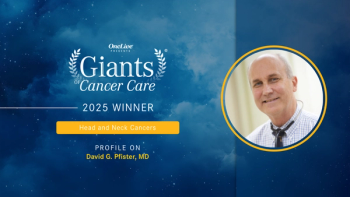
Long-Term Toxicity in HNSCC
Transcript:Ezra Cohen, MD: We’re talking about somewhat aggressive approaches in the curative-intent setting. But, Viktor, how do you balance the efficacy of these aggressive approaches with the long-term toxicity? And tell us a little bit more about the long-term toxicity that you worry about.
Viktor Grünwald, MD: I think talking about aggressive therapy, you have to think about and be careful about the patient, because we imply toxicities that are certainly acute during the course of treatment, requirements of feeding tubes, etc. It’s something you do initially. And then, what we have seen with the long-term follow-up of the RTOG studies is that there are more and more patients dying on the aggressive approach during the radiochemotherapy and then compared to radiotherapy per se. So, why is that actually? There’s some long-term toxicity that is probably coming from local problems, swallowing problems, and we have to take that into account. We have to really look into the patient and see that is the one that could get to the point where we could have an early detection of side effects that may occur. Because usually, once they’re cured, they’re on their own and they have to be sophisticated and come in if there are problems so you solve them quickly and early.
Ezra Cohen, MD: And some of these patients can suffer quite a bit from the long-term effects of the treatment. Tanguy, let me ask you the same question. How do you achieve that balance? Take me through your thought process really.
Tanguy Y. Seiwert, MD: I think we hear it again and again, and I agree with the prior comment. There is a clear balance between toxicity and efficacy of the treatment. And I think now that we have different subgroups of patients at the highest level—HPV-positive and HPV-negative, but then also HPV-smokers and maybe some elective features—I think we’re starting to realize that maybe we can adjust the treatment a little bit. So, Kevin and Viktor have mentioned already that there may be an opportunity for patients who have a really good prognosis, despite stage, HPV-positive tumors that we can actually give them less treatment.
We can go down potentially on the dose of radiation to 60 grade. We’ve actually just completed a study going down to 45 grade, and that actually seems to work. I wouldn’t say that this should be done as routine standard of care. I think it’s a very cautious approach. We have to monitor this carefully. But, clearly, we are likely overtreating a significant fraction of HPV-positive tumors. And I think getting that right is something that large centers have to do in a very controlled fashion. It’s part of clinical trials.
So, I think that balance is different for HPV-positive tumors that have a better prognosis from some of the HPV-negative tumors. On the other hand, with some very poor prognosis HPV-negative tumors, we’re talking about intensification. Maybe in those groups we should add on additional things. And we, I think, will talk about neoadjuvant chemotherapy, which is clearly controversial. But maybe in patients who had really high risk for distant failure, with poor prognosis, that’s something to consider. And it’s not necessarily standard of care, but it is considered reasonable to do. And so, we will discuss those factors. I believe that de-escalation is likely going to be successful, but right now, it should still be done as part of clinical trials. I hope that answers your question, at least in part.
Ezra Cohen, MD: So, your center, along with others, is looking at different ways to de-intensify therapy for HPV-positive patients. But what I’m hearing you say is, you’re not doing that outside of a clinical trial.
Tanguy Y. Seiwert, MD: I think it has to be done with a lot of caution as part of a clinical trial. The clinical trial is essential to monitor because obviously these are patients who are almost universally curable, and we don’t want to de-escalate to a level where potentially we lose our ability to cure. I think doing it as part of a clinical trial is essential, and there are usually great safeguards built into the trial. I think de-escalation should only be done on a clinical trial until we have large-scale data. And one effort is by the RTOG 1016 study that actually replaces cisplatin with cetuximab, and we don’t have those data. So, I wouldn’t do this outside of a clinical trial currently.
Ezra Cohen, MD: And I know in the UK, there are some efforts going on along those same lines, Kevin. I don’t know if you want to talk to us about that.
Kevin Harrington, MD, PhD: Yes, indeed. We have a study that essentially mirrors the design of the RTOG 1016, the so-called DeESCALaTE Protocol, in which cisplatin is replaced by cetuximab during radiotherapy for patients with HPV-positive disease. In addition, there is a reemergence of an evaluation of the role of surgery. And that’s not just in the UK, that is also—Tanguy, will know this—elsewhere. Christian Simon in Europe is looking at these sorts of approaches, as well. And the question there is really whether or not a surgical approach to remove the primary tumor with or without lymph nodes may yield pathological information that allows you to deliver either a low radiation dose or a MET platinum as part of adjuvant therapy, which, of course, will have a downstream beneficial effect for patients.
So, I think that all of these things are on the table, and it’s reassuring for patients to know that their doctors are looking at all of the 3 major modalities: surgery, radiation—in terms of reducing dose, reducing field size—and also the use of cisplatin-based chemotherapy with replacement by cetuximab. And then, of course, something that we will discuss a little later, potentially the role of immunotherapy agents that might indeed be able to supplant to the role of cisplatin-based chemotherapy in this setting. I think patients should be very reassured of the fact that all 3 of the major groups of clinicians looking after them are engaged in what you could think of as an “arms race” to find the best treatment approach for their patients.
Transcript Edited for Clarity


































